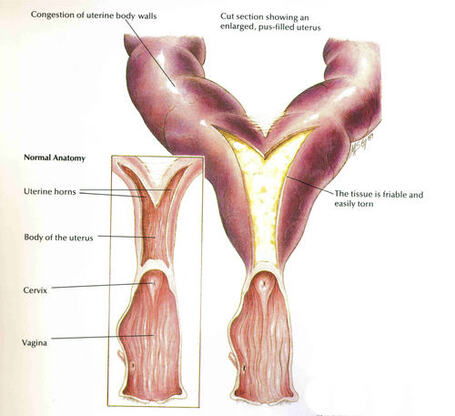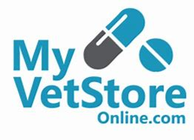Pyometra
Pyometra is a life-threatening, severe infection inside the uterus.
Infection in the lining of the uterus is established as a result of hormonal changes. After a female cat or dog goes into heat, a hormone called progesterone causes the lining of the uterus to thicken in preparation for pregnancy. If pregnancy does not occur for several heat cycles, the uterine lining continues to increase in thickness until cysts form within it. The thickened, cystic uterine lining secretes fluids that create a perfect environment for bacteria to start an infection.
Infection in the lining of the uterus is established as a result of hormonal changes. After a female cat or dog goes into heat, a hormone called progesterone causes the lining of the uterus to thicken in preparation for pregnancy. If pregnancy does not occur for several heat cycles, the uterine lining continues to increase in thickness until cysts form within it. The thickened, cystic uterine lining secretes fluids that create a perfect environment for bacteria to start an infection.
|
The cervix is the gateway to the uterus. It remains tightly closed except when a pet is in heat. When it is open, bacteria that are normally found in the vagina can enter the uterus easily. If the uterus is normal, the bacteria will not survive. If the uterus is thickened and cystic, the environment is perfect for the bacteria to grow. In addition, when these abnormal conditions exist, the muscles of the uterus cannot contract properly- this means that the bacteria that enter the uterus cannot be expelled.
The picture to the left demonstrates the anatomy of a normal uterus versus that of an infected uterus. Notice how much larger the pus-filled uterus is compared to the normal one. Pyometra may occur in young to middle aged pets; however, it is most common in older animals. Pyometra usually occurs one to two months after being in heat. |
There are two forms of pyometra: open and closed
- "Open pyometra"- means that the cervix is open and foul smelling pus from within the uterus will drain through the vagina. This thick, foul smelling discharge is often noted on the skin or hair under the tail or on bedding where the pet lays. Fever, lethargy, and loss of appetite may or may not be present.
- "Closed pyometra"- means that the cervix is closed and the pus is unable to drain. Instead, the pus builds inside the uterus causing distention of the belly. The bacteria inside the pus release toxins which are absorbed into the pet's bloodstream causing severe illness. Symptoms may include: loss of appetite, listlessness, increased drinking and urination, vomiting, and diarrhea.
Pyometra is diagnosed based on:
- history of symptoms in an intact female : these may include increased drinking, increased urination, thick foul smelling discharge from the vulva, loss of appetite, lethargy, swollen abdomen, fever, vomiting, and/or diarrhea.
- bloodwork: shows an elevation of immune system cells, dehydration, and possibly organ dysfunction secondary to bacterial toxins.
- xrays: will show an enlarged uterus if the cervix is closed. An example of a closed pyometra is visible on the xray to the left (highlighted with yellow arrows.
- an ultrasound of the abdomen may also be needed in order to differentiate pyometra from pregnancy.

The infection that occurs with pyometra generally cannot be treated with antibiotics alone- the buildup of pus is too great. The best chance a pet has to survive pyometra is through an emergency spay surgery.
During this surgery, the ovaries and infected uterus are removed. A pyometra surgery is much more complicated than a routine spay surgery, however. An infected uterus has a much larger blood supply and the tissues are very delicate and may rupture, spilling pus throughout the inside of the abdomen. The picture at the left was taken during a pyometra surgery. Notice how distended the uterus appears (a normal uterus is closer to the size of your pinkie finger or smaller). Prolonged hospitalization, IV fluids, and IV antibiotics are often needed. Severely infected pets have a 50:50 chance of surviving surgery- the odds of survival are extremely low if surgery is not performed. If surgery cannot be performed, euthanasia should be considered as an alternative to suffering.
Spaying your pets prior to first heat cycle is the best way to prevent pyometra from happening.
During this surgery, the ovaries and infected uterus are removed. A pyometra surgery is much more complicated than a routine spay surgery, however. An infected uterus has a much larger blood supply and the tissues are very delicate and may rupture, spilling pus throughout the inside of the abdomen. The picture at the left was taken during a pyometra surgery. Notice how distended the uterus appears (a normal uterus is closer to the size of your pinkie finger or smaller). Prolonged hospitalization, IV fluids, and IV antibiotics are often needed. Severely infected pets have a 50:50 chance of surviving surgery- the odds of survival are extremely low if surgery is not performed. If surgery cannot be performed, euthanasia should be considered as an alternative to suffering.
Spaying your pets prior to first heat cycle is the best way to prevent pyometra from happening.

